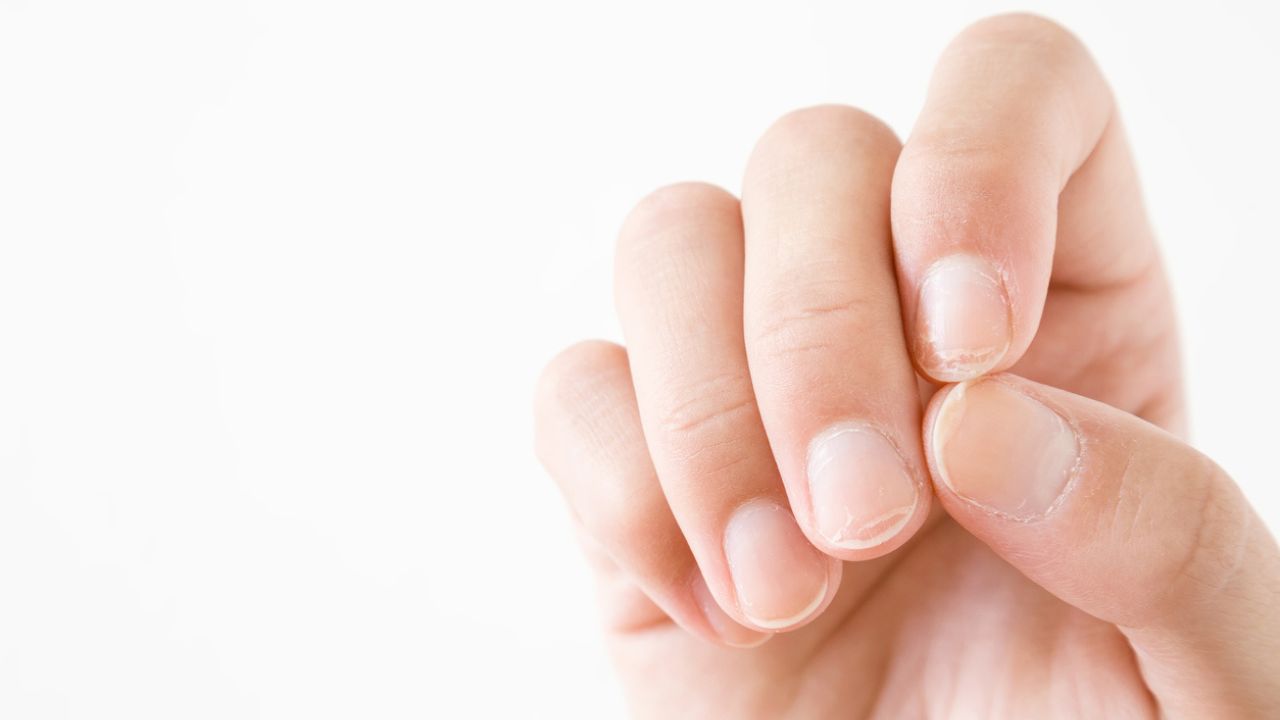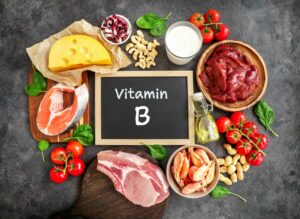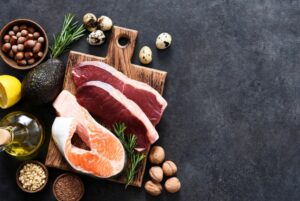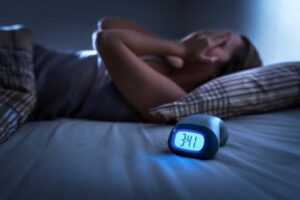From tiredness to cracked lips, you could be lacking in vitamin B. Nutritionist Rob Hobson reveals everything we need to know about B vitamins and why they could be key to a healthier life
As the cost of living continues to rise, people have no choice but to spend less on food, which is often the only manoeuvrable part of their household budget.
This may mean eating a less nutritionally dense diet, and stress and anxiety can affect mood.
One group of vitamins essential for many aspects of your health is the B complex
Understanding how to make the most of your diet and the meals you cook can help you to get everything you need, no matter how stretched the budget becomes.
One group of vitamins essential for many aspects of your health is the B complex, which includes how well and energised you feel.
This is the one supplement you should consider when you’re feeling low in energy, especially if you are not eating the best you can or experiencing stress and anxiety.
READ MORE: Brain food: 7 key nutrients for a healthier brain
A recent study published in the journal Human Psychopharmacology has shown that vitamin B6 supplements can help to relieve anxiety and depression.
Researchers at the University of Reading compared the effect of high-dose vitamin B6 supplements (100mg per day) against vitamin B12 and placebo.
After 30 to 35 days, an apparent reduction in anxiety and a trend towards reduced depression was seen in those taking vitamin B6 compared with the other two1. The researchers believe this is due to the increased synthesis of GABA – a calming neurotransmitter.
The B complex has also been linked to brain health
There are many more little-known reasons why it boosts our health. For example, vitamin B6 can help the body manufacture neurotransmitters (brain chemicals that communicate information throughout our brain and body), such as serotonin. This allows the body to cope with depression, stress, and anxiety.
The B complex has also been linked to brain health as the B vitamins act together to enable neurons to work more efficiently.
Research shows that low levels, especially B6, B12, and folate, may affect how well the brain function with ageing. B vitamins also help remove cell waste allowing cells to function optimally. This waste is primarily proteins that, if left alone, can form clumps toxic to the brain.
The good news?
Most of us get more than vitamin B through our diet – many kinds of cereal, for example, are fortified with it, and it’s found in a wide variety of foods.
The bad?
Our hectic, stress-filled lifestyles, coupled with a sugary, white-carb, and booze-filled diet (something many of us are guilty of), can deplete our reserves of this vital vitamin.
Your body is also unable to store B vitamins, so they must be replenished daily (the exception is B12, which can be stored in the liver). In short, this could be why you’re suffering from several ailments (see below for a detailed breakdown) or general lethargy.
‘Vegans must be particularly aware of their vitamin B12 intake,’ says Dr. Sarah Brewer, Healthspan Medical Director.
‘This is because vitamin B12 does not occur naturally in plant-based foods other than those which have been fortified.
‘Investing in a daily supplement such as Healthspan Vitamin B12 Blackcurrant Oral Spray, £8.95 may be prudent for those following a vegan diet’.
Also available to buy on Amazon.
READ MORE: Feeling hangry? 7 ways to control your hunger
What are B vitamins?
The B vitamins are a group of eight different vitamins which form the B complex.
Specifically, this is comprised of: thiamin (B1), riboflavin (B2), niacin (B3), pantothenic acid (B5), pyridoxine (B6), biotin (B7), folate (B9) and cobalamin(B12).
These vitamins are water-soluble except for B12, which can be stored in the liver. This means that B vitamins must be topped up daily from the foods you eat and, in some cases, supplements.
The B vitamin complex plays an essential role in maintaining health, including assisting enzymes in helping release energy from the food you eat, maintaining healthy skin, and ensuring good brain health.
3 ways B vitamins are depleted
The B vitamins are required to convert food into energy. When the body needs more energy, it uses more B vitamins.
This means very active people may have a higher demand for B vitamins.
#1 Poor diet
A diet high in sugar and white carbohydrate foods (e.g. white bread, white pasta) can take its toll on the B vitamins.
These foods require large amounts of B vitamins to help metabolise them into a useable energy source within the body. This means stocks are lower to keep other bodily functions running as they should.
#2 Alcohol
Drinking more than the recommended 14 units of alcohol a week can burn B vitamins quickly, especially thiamin (B1). In turn, low thiamin levels can affect your mood.
Not only that, but alcohol also stops B vitamins from being absorbed by the body, so there’s a double-whammy effect.
#3 Stress
B vitamins play a crucial role in maintaining a healthy nervous system.
While a bit of stress is standard in daily life, excessive stress can burden the body’s requirement for B vitamins – it needs more to manufacture neurotransmitters to keep our mood stable, and stores are depleted if stressed.
These vitamins are also used to make neurotransmitters such as adrenaline used in the ‘fight or flight response, as well as serotonin and GABA, which help to relax the body.
Stress can also impact our diet, leading to us skipping meals and choosing foods of poor nutritional quality, which may reduce the number of B vitamins we take.
READ MORE: Stress eating comfort foods? Break your unhealthy food habits with these simple tips
The B vitamin Bible
While the B complex all share similar roles in the body, the most common is food metabolism into energy. Still, some differences exist, and the deficiency symptoms can vary between the nutrients within this group.
B1 – Thiamine
Why do you need it?
This vitamin is required for the breakdown and release of energy from food. You also need it to maintain a healthy nervous system – vital to prevent low mood.
Recommended Daily Allowance (RDA) = 1.1mg
Signs of deficiency?
- Tiredness
- Loss of concentration
- Irritability
- Headache
- Loss of appetite
- Nausea
- Constipation
How can you eat more of it?
Asparagus, peas, sunflower seeds, green peas, trout, macadamia nuts, pistachio nuts, acorn squash, soya beans, black beans, navy beans, lentils and yoghurt.
B2 – Riboflavin
Why do you need it?
Required for keeping your skin and eyes healthy, maintaining a healthy nervous system, and converting the food you eat into energy.
RDA = 1.4mg
Signs of deficiency?
- Mouth ulcers
- Sores and cracks at the corner of the mouth (angular cheilosis)
- Tired, sensitive, gritty blood-shot eyes
- Sensitivity to bright light
- Sore throat and tongue
- Itching
- Scaly, eczema-like skin rash (especially on the face and nose)
- Insomnia
How can you eat more of it?
Mushrooms, eggs, spinach, broccoli, asparagus, almonds, cheese, mackerel, squid, sesame seeds, soybeans, wholegrains, almonds, beef and pork.
READ MORE: Which vitamins do I need in pregnancy?
B3 – NIACIN
Why do you need it?
Required to metabolise food into energy to ward off fatigue while also helping to keep your mood stable.
RDA = 16mg
Signs of deficiency?
- Tiredness
- Feeling weak
- Losing appetite
- Controlled blood sugar
- Cholesterol
- Headache
- Nausea
How can you eat more of it?
Tuna, chicken, turkey, mushrooms, sea vegetables, peanuts, peas, sunflower seeds, brown rice, avocado and banana.
B5 – Pantothenic acid
Why do you need it?
So that the body can make and metabolise vitamin D – essential for healthy bones, respiratory health (your heart and lungs), and a robust immune system. B5 also helps to convert food into energy.
RDA = 6mg
Signs of deficiency?
- Feeling tired
- Weak
- Unable to deal with stress
- Indigestion
- Insomnia
- Loss of appetite
How can you eat more or it?
Liver, sunflower seeds, salmon, avocados, broccoli, mushrooms, oats, milk, lentils, potatoes and nuts.
READ MORE: 9 natural insomnia remedies to help you sleep better tonight
B6 – pyridoxine
Why do you need it?
It helps the body manufacture neurotransmitters, such as serotonin, which aids in the body’s ability to cope with depression, stress, and anxiety. Vitamin B6 may also help boost the immune system during times of anxiety.
Research has also shown that B6 supplements may prove helpful in relieving the emotional symptoms associated with PMS. Not only that, it’s essential in forming haemoglobin, the substance in red blood cells that carries oxygen around the body.
RDA = 1.4mg
Signs of deficiency?
- Greasy rash on the forehead and around the nose
- Low sex drive
- Irritability
- Anxiety
- Depression
- Headache
How can you eat more of it?
Peppers, cauliflower, banana, celery, Brussels sprouts, tuna, garlic, sunflower seeds, pistachio nuts, turkey, chicken, prunes, avocado, chicken
B7 – biotin
Why do you need it?
Biotin is required to help the body to break down fat and is essential for healthy hair, nails, and skin.
RDA = 50mcg
Signs of deficiency?
- Dry, scaly, flaky skin
- Rash around the eyes, nose, and mouth
- Brittle hair and nails
- Tiredness/lethargy
- Withdrawn behaviour
- Loss of appetite
How can you eat more of it?
This vitamin is found in many foods but in tiny amounts.
Egg yolk, sweet potatoes, yeast extract, mushrooms, cheese, dairy, liver, avocado, raspberries, bananas, nut butter, salmon, and sardines.
READ MORE: 13 steps to perfect summer skin
B9 – folic acid
Why do you need it?
Important during the first three months of pregnancy to reduce the risk of neural tube defects such as spina bifida. Pregnant women are advised to supplement their diet with 400mcg of folic acid up until the 12th week of their pregnancy.
This B vitamin has also been shown to help break down an amino acid called homocysteine in the blood. Excessing this has been linked with an increased risk of coronary heart disease, stroke, and peripheral vascular disease.
RDA = 200mcg
Signs of deficiency?
- Red, sore tongue
- Cracking at the corners of the mouth
- Tiredness/weakness
- Irritability
- Forgetfulness/confusion
- Insomnia
- Anaemia
- Muscular cramps
- Depression
- Dementia
How to eat more of it?
Dark green vegetables, liver, soybeans, lentils, asparagus, mango, beans, seafood, spinach, lettuce, avocado, broccoli, oranges and black-eyed peas.
B12 – cobalamin
Why do you need it?
Produce healthy red blood cells and protect cells from the damage caused by excess free radicals and also required to maintain a healthy nervous and immune system.
RDA = 2.5mcg
Signs of deficiency?
- Sore tongue
- Tiredness/exhaustion
- Menstrual disorders
- Reduced immunity
- Pernicious anaemia (where not enough red blood cells are present due to a lack of vitamin B12)
How can you eat more of it?
Shellfish, liver, mackerel, crab, tofu, red meat, milk, cheese, fortified cereals and eggs.
As a result, B12 may be difficult to glean from a vegan diet.
If you think you may be deficient in vitamin B due to your diet or lifestyle, consider taking a B complex supplement. I firmly believe if there’s one vitamin everyone should consider taking, it’s this one.
Try Healthspan Vitamin B Complex, £5.95 for 180 tablets. Also available to buy on Amazon.
Like this article? Sign up to our newsletter to get more articles like this delivered straight to your inbox.



























































